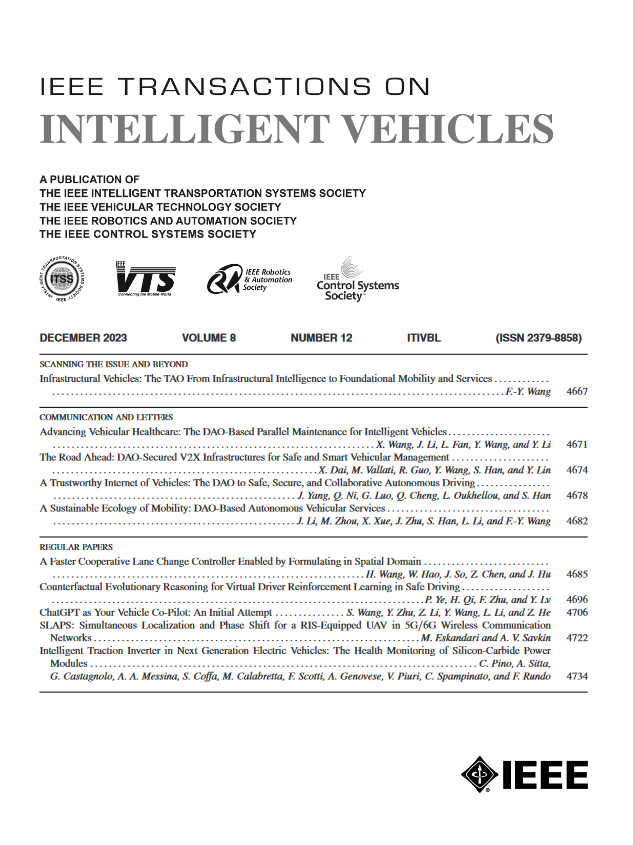A Dynamic Context-Aware Approach for Vessel Trajectory Prediction Based on Multi-Stage Deep Learning
IF 14
1区 工程技术
Q1 COMPUTER SCIENCE, ARTIFICIAL INTELLIGENCE
引用次数: 0
Abstract
Accurate and reliable vessel trajectory prediction is challenging due to the highly non-linear, intricate and stochastic features of maritime transport networks, but its solutions are vital for ensuring maritime safety, intelligence and efficiency. In this study, a dynamic context-aware (DCA) approach based on multi-stage deep learning, termed DCA-MSDL, is proposed to address this challenge and improve prediction accuracy by considering a broader range of influencing factors. An inverted Transformer (iTransformer)-based deep learning architecture is first constructed for vessel turning status prediction. A deep generative framework is then presented for vessel trajectory augmentation. Following that, multiple potential trajectories are predicted using a novel data-driven algorithm based on multiple steps of nearest neighbor selection. Finally, trajectory enhancement considering dynamic traffic context is proposed to further improve prediction accuracy. With the separate steps of vessel turning status prediction, trajectory augmentation, trajectory prediction and trajectory enhancement, our approach allows us to explicitly explain the factors affecting the prediction accuracy and enable targeted improvements correspondingly. Extensive tests on real-world trajectories of vessels in the Singapore Strait have been conducted and the following encouraging results have been obtained: 1) the iTransformer-based turning status prediction achieves high accuracy at 93.37%, beating other state-of-the-art machine learning-based time-series models; 2) the deep generative model-based trajectory augmentation reduces error by 8.26%, and it significantly outperforms other oversampling techniques; 3) DCA-MSDL increases the prediction accuracy by at least 33.75% in comparison to existing benchmarking methods; 4) the devised dynamic context-aware trajectory enhancement in DCA-MSDL significantly improves the accuracy by 3.53%.基于多阶段深度学习的船舶轨迹预测动态环境感知方法
由于海上运输网络高度非线性、复杂和随机的特点,准确可靠的船舶轨迹预测具有挑战性,但其解决方案对于确保海上安全、智能和效率至关重要。在本研究中,提出了一种基于多阶段深度学习的动态上下文感知(DCA)方法,称为DCA- msdl,通过考虑更广泛的影响因素来解决这一挑战并提高预测精度。首先构建了一种基于倒转变压器(ittransformer)的深度学习架构,用于船舶转向状态预测。然后提出了一种用于船舶轨迹增强的深度生成框架。然后,使用基于最近邻选择多步的新型数据驱动算法预测多个潜在轨迹。最后,提出了考虑动态交通环境的轨迹增强方法,进一步提高了预测精度。通过船舶转向状态预测、轨迹增强、轨迹预测和轨迹增强等步骤,我们的方法可以明确地解释影响预测精度的因素,并相应地进行有针对性的改进。在新加坡海峡的船舶实际轨迹上进行了大量的测试,获得了以下令人鼓舞的结果:1)基于ittransformer的转向状态预测达到了93.37%的高精度,超过了其他最先进的基于机器学习的时间序列模型;2)基于深度生成模型的轨迹增强误差降低了8.26%,显著优于其他过采样技术;3)与现有基准测试方法相比,DCA-MSDL的预测准确率至少提高了33.75%;4)设计的DCA-MSDL的动态上下文感知轨迹增强方法将准确率显著提高了3.53%。
本文章由计算机程序翻译,如有差异,请以英文原文为准。
求助全文
约1分钟内获得全文
求助全文
来源期刊

IEEE Transactions on Intelligent Vehicles
Mathematics-Control and Optimization
CiteScore
12.10
自引率
13.40%
发文量
177
期刊介绍:
The IEEE Transactions on Intelligent Vehicles (T-IV) is a premier platform for publishing peer-reviewed articles that present innovative research concepts, application results, significant theoretical findings, and application case studies in the field of intelligent vehicles. With a particular emphasis on automated vehicles within roadway environments, T-IV aims to raise awareness of pressing research and application challenges.
Our focus is on providing critical information to the intelligent vehicle community, serving as a dissemination vehicle for IEEE ITS Society members and others interested in learning about the state-of-the-art developments and progress in research and applications related to intelligent vehicles. Join us in advancing knowledge and innovation in this dynamic field.
 求助内容:
求助内容: 应助结果提醒方式:
应助结果提醒方式:


